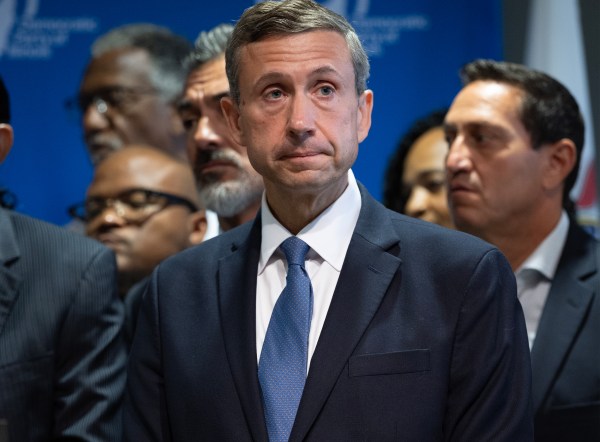During a recent political conference in Washington, D.C., a collection of lawmakers condemned the Democratic Party as elitist, leftist, and out of touch. All the speakers were Democrats—as were most in an audience that applauded at nearly every turn.
“By and large, in the Democratic Party, we have a cultural problem,” Michigan Rep. Kristen McDonald Rivet said on stage during an appearance at WelcomeFest 2025, an annual gathering of centrist Democrats organized by WelcomePAC and more than half-dozen like-minded groups that believe left-wing extremists have become too dominant in the Democratic Party.
“We spend a lot of time in rooms with super-smart people creating policy agendas and thinking: ‘What words do we have to give?’” she added. “We’ve got a bunch of Democrats who’ve started to curse. Like the problem is, we didn’t say ‘f—’ enough. The real problem is that we have created too many rooms where somebody with mud on their boots doesn’t feel like they’re welcome.”
McDonald Rivet is a first-term lawmaker who in 2024 captured a central Michigan district, anchored in Saginaw, that delivered more than 50 percent of its vote to President Donald Trump. Here at WelcomeFest, a conference dedicated to elevating centrist Democrats, the congresswoman’s unvarnished critique of the party was, well, welcomed. Organizers and those in attendance believe running more pragmatists with military, small business, and working class backgrounds is key to improving the Democrats’ prospects in swing districts and battleground states.
“It’s our job to win,” WelcomePAC co-founder Lauren Harper Pope said in opening remarks to a downtown Washington hotel ballroom of a few hundred conference-goers grappling with how to reverse the rightward shift of voting blocs—Hispanics, working class, young men—long considered core Democratic constituencies. The picture painted by Lakshya Jain, a data scientist who models voting behavior, is dire. He told the conference Democrats need to prioritize fielding candidates “who know how to talk to ordinary people.”
Indeed, many of the Democrats’ problems are basic, according to the lawmakers who headlined WelcomeFest and took turns ripping the bark off of the party.
Democrats often fail to nominate appealing candidates, listen to voters, and craft agendas based on voters' top priorities, the speakers noted, instead yielding to the demands of vocal left-wing activists and advocacy groups who represent a distinct minority of center-left voters. New York Rep. Tom Suozzi, who was reelected in a suburban Long Island district that backed Trump with 51.4 percent of the vote, said he won because he both listened to his constituents and addressed issues they cared about most.
“If you ask the American voters, what are the issues they’re most concerned about—the top five issues—they say: the economy, immigration, taxes, crime, and health care,” Suozzi, 62, said. “If you ask the same people, what do you think the Democrats are focused on, they say: choice, LGBT protections, health care—there is a little bit of a crossover there—saving democracy, and climate change.”
“Those are, all five, very important issues,” he added. “But they are not the issues we’re going to win a national campaign on.”
From a similar but distinct angle, first-term Rep. Adam Gray said much the same thing. Gray, who represents an agriculture-heavy district in California’s Central Valley that Trump won with 51.4 percent, hails from the dairy industry. When problems arise on a farm—which is often—immediate solutions are required to keep the operation going. Embracing this sort of political pragmatism, and deemphasizing polarizing ideology, would go a long way toward improving Democrats’ prospects, Gray suggested.
“It’s funny to listen to the dialogue … about how to fix the Democratic Party,” Gray said. “We should start by just solving some problems. Do something that actually improves somebody’s life and the rest will follow.”
Gray joined Rep. Marie Gluesenkamp Perez of Washington state and Rep. Jared Golden of Maine on stage to discuss the secrets of their success in House districts Trump won in 2024. (All three affiliate with the congressional Blue Dog caucus of conservative and moderate Democrats.)
Gluesenkamp Perez’s seat, with its mixture of exurban and rural communities, delivered 50.3 percent of its vote to the president. Her advice to fellow Democrats looking to compete in similar districts, or for avoiding a 2028 repeat of what happened last November? Essentially—stop playing ideological enforcer and do what it takes to truly broaden the Democratic tent.
“People are profoundly heterodox. If you actually talk to normal people, the same person who has pretty left views on trans rights will also be very fiercely [pro] Second Amendment,” Gluesenkamp Perez said. “We are a small caucus. There’s 10 of us. But I would argue that most Americans are Blue Dogs.”
WelcomePAC, a political action committee that supports centrist Democrats, and WelcomeFest join other Democratic-aligned groups, gatherings and initiatives exploring ways to revive the party’s prospects in the wake of Trump’s return to the White House, achieved with a narrow but decisive victory over then-Vice President Kamala Harris. This effort has been joined by Democrats across the political spectrum. But left-wing progressives, uninterested in ceding power to other factions of the party’s coalition, are also participating and it’s unclear whether centrist Democrats can succeed in pushing the party toward the political middle.
But what is clear is that centrist Democrats are willing to push back on their left flank in a way others in the party are not. For instance: Israel’s war in Gaza to eliminate Hamas, the terrorist group that murdered 1,200 people, mostly civilians, and took hundreds hostage on October 7, 2023. The progressive base, sympathetic to the Palestinians, has protested those Democrats who support Israel’s military campaign to decapitate Hamas and defend the Jewish state’s right to exist.
During last summer’s Democratic National Convention in Chicago, then-President Joe Biden said during his speech of the pro-Palestinian protesters who were denouncing his administration’s military support for Israel: “Those protesters out in the street, they have a point. A lot of innocent people are being killed on both sides.” Harris also expressed sympathy for pro-Palestinian protesters, saying to them during one of her 2024 campaign rallies: “I hear you.”
But when New York Rep. Ritchie Torres, a prominent Israel supporter, was interrupted by roughly a half-dozen pro-Palestinian protesters during his WelcomeFest appearance—some flashing homemade signs that read “Gays Against Genocide”—organizers quickly shut it down. They were immediately removed from the ballroom as Carly Simon’s “You’re So Vain” blasted from the loudspeakers, with its catchphrase line: “You probably think this song is about you.” None of the Democratic lawmakers or people in the audience expressed solidarity with the agitators.
Torres represents a deep blue New York City district anchored in the Bronx. But the congressman has become something of a folk hero to centrist Democrats focused on growing the party because of his willingness to speak out against left-wing activists. And after the protesters were cleared out, Torres had a message for the centrists, too.
“I’m often saying what many people are thinking but are too afraid to say,” he explained. “I feel like the greatest threat to our democracy does not come from the far left or the far right—but it comes from cowardice and complacency of a center that lives in fear of extremes.”







Please note that we at The Dispatch hold ourselves, our work, and our commenters to a higher standard than other places on the internet. We welcome comments that foster genuine debate or discussion—including comments critical of us or our work—but responses that include ad hominem attacks on fellow Dispatch members or are intended to stoke fear and anger may be moderated.
With your membership, you only have the ability to comment on The Morning Dispatch articles. Consider upgrading to join the conversation everywhere.